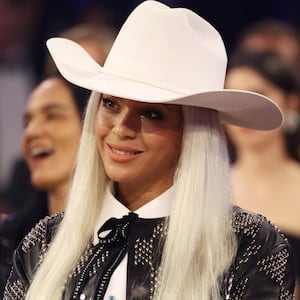It is a revival, not a reclamation, and Beyoncé is here to cleanse us of our sins. The Bible says in Matthew 18:20, “For where two or three are gathered together in my name, there am I in the midst of them.” And hidden in the midst of Beyoncé’s new album Cowboy Carter, released on Friday, there is a spirit; that of God, but also of Beyoncé, who has appointed herself as music’s lord and savior.
There is no genre she cannot save, and no genre she cannot touch, because they all belong to her. She is their be-all and end-all. Music’s alpha and omega. And a few days before Resurrection Sunday, when practitioners all over the world, but especially in the deep bayous and marshes of the American South, will convene to celebrate the second coming of Christ, Beyoncé, too, has just cause for celebration. Because she has just rewritten the music game in her image.
In the days leading up to Cowboy Carter’s release, the Houston native described her eighth studio effort as a Beyoncé album, not a country album, and she did not tell a lie. The sprawling, 27-track LP begins through the viewpoint of Lady Liberty on “Ameriican Requiem,” because in Beyoncé’s country, she, too, is the first thing you see when you enter America on Ellis Island. There in her braided glory, cigar in her hand, pageant sash around her waist, is how she welcomes you to her United States.
In that opening track, Beyoncé tells her origin story: “The grandbaby of a moonshine man / Gadsen, Alabama / Got folk down in Galveston / Rooted in Louisiana,” she sings, positioning herself as a Southern belle who claims her country heritage with pride. At the same time, she quickly reveals her intention with Cowboy Carter. “Used to say I spoke ‘too country’ / And the rejection came, said ‘I wasn’t country enough’ / Said I wouldn’t saddle up, but / If that ain’t country, tell me what is?” she sings. “Plant my bare feet on solid ground for years / They don’t, don’t know how hard I had to fight for this.”
Within those lines resides Beyoncé’s sermon, and its message is clear: She is fed up with folks’ lies about her not being “country enough” when in fact, she is this country. She is America. And so is Linda Martell. And Tanner Adell. And Brittney Spencer. And Tiera Kennedy. And Reyna Roberts. And Willie Nelson. And Dolly Parton. And Shaboozey. And Miley Cyrus. And Post Malone. And, of course, Rumi Carter.
It is through the eyes of Rumi, her youngest daughter, whose voice we hear on “Protector,” that we see Beyoncé as a guiding light: “I gave watеr to the soil / And now it feeds me, yeah, yеah (Yeah) / And there you are, shaded underneath it all / I feel proud of who I am / Because you need me, yeah.” Beyoncé understands the importance of the mother to the child; it’s become her guiding force in recent years, built upon the foundation of her relationship with her own mother, Tina Knowles, also known as Mama Tina. She is her mother’s child and her mother lives within her. It is here that she reveals the album’s other intention: lineage, the tracing of one’s self in the context of their ancestral, but also musical, descent. “There’s a long line of hands carryin’ your name, mm / Liftin’ you up, so you will be raised,” she sings on “Protector.”
Beyoncé couldn’t be here without Mama Tina, but she also couldn’t be in the country space without Linda Martell. On the interlude track “The Linda Martell Show,” the trailblazing artist takes center stage—a stage once wrongfully taken away from her, that Beyoncé has now replaced with an even louder, bolder, bigger platform. And by having Martell introduce “Ya Ya,” her long-awaited Tina Turner tribute where she embodies the spirit of her mentor in a rockabilly-inspired tribute, Beyoncé is paying homage to two mothers at once.
Motherhood and remembrance are the central tenets of Cowboy Carter. Look no further than “Blackbiird,” Beyoncé’s reimagining of the Beatles’ 1968 classic inspired by the Civil Rights Movement and the Little Rock Nine. Beyoncé takes on the role of a mother to the other featured singers on the track, all of whom are part of the next generation of Black women in country music: Tanner Adell, Brittney Spencer, Tiera Kennedy, and Reyna Roberts. These women have experienced the brute end of harassment because of their decision to enter a space that does not want them, that loathes them, that tries its best to not allow them to succeed. Yet it is through their collective efforts, their collective moments, that they gather one by one, and two by two, in a medley of voices reminiscent of church choir, thereby summoning the spirit of country. Because Beyoncé needed them, as much as they needed her, for “this moment to arise.”
It’s a moment that is country by name only, because country looks and feels different to Black folks. Despite having the same country of origin on our passports, we live in a different world than Nashville, which means the mainstream country industry may not receive this album in the same way. Yes, the inclusion of Dolly Parton and Willie Nelson might persuade those in the upper rooms of the Recording Academy to grant Beyoncé a Grammy nomination in a country category—an honor they refused her back in 2017—but even Beyoncé knows that wouldn’t account for much.
Enter “Sweet Honey Buckiin’” for evidence. On the Pharrell Williams-produced track, Beyoncé acknowledges the Recording Academy and their repeated refusal to award her Album of the Year: “A-O-T-Y, I ain’t win (That’s cool) / I ain’t stuntin’ ’bout them / Take that shit on the chin / Come back and fuck up the pen (Yeah).”
But here’s the thing about the outlaw, the alter ego Beyoncé becomes on the latter half of the album: They don’t give a fuck about the rules, which means Beyoncé really doesn’t give a fuck about the Grammys. Respectfully.
When Martell says, “Genres are a funny little concept, aren’t they? Yes they are,” on “Spaghetti,” the third and final intention of the album is brought to light: little Black girls from the South can do anything, and you can’t tell them what to do because you’re not their mama. In layman’s terms, the Recording Academy and any other governing institution of music cannot police Beyoncé Giselle Knowles Carter, because they are not Tina Knowles. And therein lies the album’s true sense of joy and release.
Country, gospel, soul, blues, R&B, pop, psychedelic rock, and more all find themselves as key members of Beyoncé’s country. Her country is more dimensional and multifaceted than Nashville could ever dream of, because Black folks in the country had to imagine and conjure worlds that did not even exist during enslavement and sharecropping in the heavily segregated Jim Crow South. It is in the fields of Smithville, Texas, that DJ Screw first began to conceptualize the genre of “chopped and screwed.” It is in the waters of Port Arthur, Texas, that Pimp C first began to make country rap tunes. And it is the city of Houston, Texas, that gave birth to Beyoncé.
Cowboy Carter is not a “country” album and it doesn’t have to be, because Beyoncé is, in fact, country enough. There is no singular way to be possible, and despite what Nashville says or thinks or applauds, the Black country experience has never been that. Because for Black folks from the country, our validation comes from the Lord, and our mamas second, and Beyoncé is covered on both ends. So in the spirit of Matthew 11:28, “Come to me, all you who are weary and burdened, and I will give you rest.”
There is a church that resides in Beyoncé, and Cowboy Carter is her Bible.







